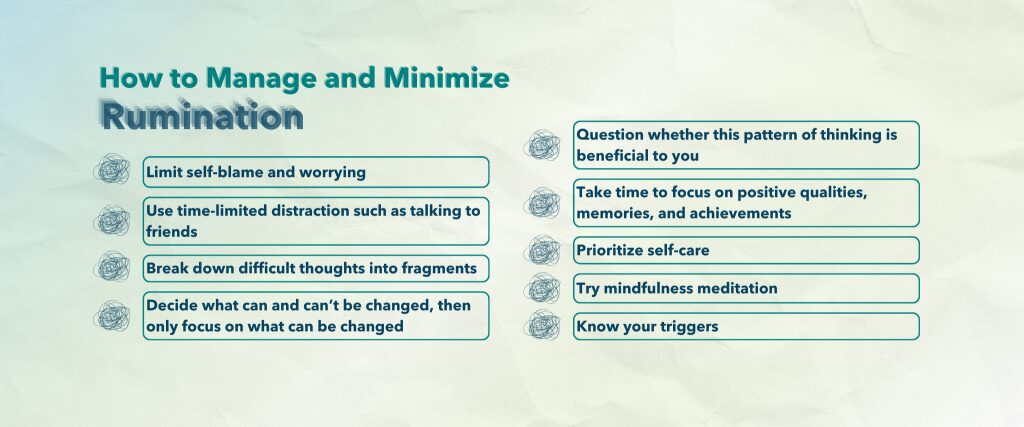
How Rumination Affects Your Mental Health
Have you ever found yourself stuck in an endless loop of overthinking, worrying, and replaying out scenarios in your head? Rumination—the habit of getting caught in repetitive, negative thoughts—can feel exhausting and disruptive, but rest assured, it’s a struggle many face, and there is a way out.
At Compass Health Center, we aim to provide clarity and practical tools to help individuals break free from the grip of repetitive, negative thinking. Understanding what rumination is and how it impacts your mental wellness is the first step in taking control of your intrusive and overwhelming thoughts.
If you’re asking yourself, “Why do I ruminate so much?” you’re in the right place. We’ll answer your questions and share practical tips to leave you feeling empowered and validated.
Keep reading to explore more on:
- What is rumination?
- How does it affect mental health?
- What are the causes of rumination?
- What evidence-based treatment options are available?
What is Rumination?
Rumination is the process of repeatedly focusing on a thought, often replaying scenarios and fixating on the negative. It occurs when someone becomes stuck in a mental loop, turning over the same thought without reaching a resolution. If ruminating becomes habitual, an individual may feel intensified feelings of guilt, frustration, and sadness, creating a cycle that becomes challenging to break.
This habit often stems from underlying factors, such as anxiety-provoking experiences, embarrassing experiences, unresolved trauma, or negative thought patterns. For instance, if an individual has an interaction they perceive as awkward, and they continue to think about it and stew in it, they may develop negative self-perception as a result of this ruminating.
If you’re constantly replaying past mistakes, feeling distressed, dwelling on negative or uncomfortable interactions, or obsessing over perceived flaws, it might be time to explore tools and strategies to interrupt these patterns and help you understand the ruminative thought process.

Is Rumination a Mental Illness?
Rumination isn’t a mental illness, but it can be a sign of underlying mental health conditions, like depression, generalized anxiety disorder, or obsessive-compulsive disorder (OCD). Rumination can also be a response to stress or perfectionism in individuals without a diagnosed mental illness.
Whatever the underlying cause, recognizing this pattern is an important step toward seeking support. The conditions surrounding rumination may cause individuals to second-guess themselves, think negatively, and experience an overwhelming sense of self-doubt.
What Causes Rumination?
There are many potential causes of rumination, and as mentioned above, mental health conditions aren’t always the primary cause. Some common causes of rumination include:
- perfectionist tendencies and fear of failure;
- unresolved trauma, such as loss, illness, abuse or other negative events;
- high-stress environments and demanding life circumstances;
- negative self-perceptions and beliefs; and
- anxiety disorders or other mental health conditions.

The Impact of Rumination on Mental Health
Small doses of gentle self-reflection can be healthy and adaptive, but this is a slippery slope. Excessive rumination can negatively impact health, both mental and physical. Addressing repetitive thoughts early is crucial, as they can escalate into patterns that affect daily functioning.
The Link Between Excessive Rumination and Anxiety
Excessive rumination can really ramp up anxiety and trap you in a cycle of worry about specific fears. This mental loop can slow down your progress and negatively impact your mental health and quality of life. Let’s explore why that happens and how to break free.
Rumination Amplifies Negative Emotions
Repetitive thought patterns can intensify feelings of sadness, frustration, and doubt, leading to an endless cycle of self-criticism and pessimism. Becoming aware of this cycle allows individuals to take proactive steps toward a healthier mindset and more positive self-talk.
Rumination Affects Problem-Solving Skills
As rumination spirals, it can lead to chronic overthinking that clouds judgment and makes it harder to tackle challenges. Breaking the cycle can be done by redirecting your focus toward actionable solutions, rather than a loop of endless thoughts.
Rumination Encourages Avoidance
We all face moments of self-doubt that can leave us questioning our abilities; it’s part of the human experience. Rumination becomes problematic when it leads to avoidant behaviors, often overwhelming individuals who may “put their guard up” and create barriers to personal and professional growth.
Rumination Causes Insomnia
If you’ve ever had a sleepless night cycling through your thoughts, you’re not alone, and we understand this can be disruptive. Poor sleep due to rumination can lead to irritability, exhaustion, and poor health.
Rumination Affects Physical Health
As life throws mental and emotional challenges our way, it’s easy for our physical health to take a hit. Chronic stress often feeds ruminative thought patterns, which can flood our bodies with adrenaline and cortisol, affecting our well-being.
Rumination Treatment Options with a Mental Health Professional
At Compass Health Center, we understand that rumination can often accompany mental health challenges. Therapy is typically integrated with a comprehensive mental health treatment program.
This holistic approach ensures you receive the support you need to navigate your thoughts and emotions effectively. Rumination is a bad habit for the brain, so therapeutic techniques involve training the brain/individual to think more constructively and overcome the ruminative thought process.
Cognitive behavior therapy (CBT), helps individuals challenge negative thought patterns. At Compass Health Center, we’ll help provide strategies to break the rumination cycle, not being controlled by it.
Mindfulness and meditation use specific techniques to help you become aware of ruminating thoughts without becoming absorbed by them. We can also help you view your thought process objectively.
Acceptance and Commitment Therapy (ACT) focuses on accepting thoughts without judgment and shifting focus to constructive actions. This is a great approach to managing difficult thoughts while understanding they may come from a valid place, yet they could be better managed.
Alongside professional care at Compass Health Center, we can guide you through lifestyle changes that will better focus your mind and body. These include exercise, healthy sleep habits, and stress management techniques that support mental well-being and reduce rumination and negative aspects of it.
The Compass Health Center approach is based on expertise and commitment to treating complex anxiety and rumination, whether in children, teens, or adults.
How to Manage and Minimize Rumination
- Limit self-blame and worrying, and know when to put the thought to rest and focus on the present.
- Use time-limited distractions, such as speaking to friends, watching your comfort show or movie, reading, or physical activity.
- Break down difficult thoughts into fragments that can be realistically solved.
- Decide what can and can’t be changed, then only focus on what can be changed.
- Question whether this pattern of thinking is beneficial to you.
- Take time to focus on positive qualities, memories, and achievements.
- Prioritize self-care, compassion, and understanding.
- Try mindfulness meditation techniques to refresh your mind.
- Know your triggers for better thought management.
Get Professional Rumination Mental Health Support at Compass Health Center
Curious about ruminative thoughts and therapy approaches? Dive deeper with us on our OCD and complex anxiety treatment page, where we offer insights and support to help you navigate these challenges if you or someone you know is struggling with ruminative thoughts and excessive worry.
We are mental health professionals, and we care. Contact us today if you experience rumination and to get started in your search for answers regarding what rumination is and your mental health.



